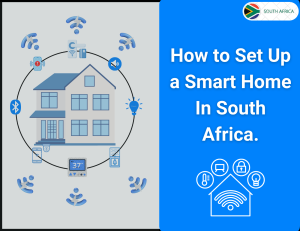
If you think Jarvis—Iron Man’s AI personal assistant—is cool then you’d love the idea of a smart home. But, like Iron Man’s Superhero Ai trusted ally, setting up a smart home in South Africa can be challenging especially for a beginner.
Whether it is the challenge of figuring out the smart devices you’ll need, how to integrate them with exiting home devices, creating a smart home in South Africa requires careful consideration and planning.
In this article we shared practical tips on how to create a smart home in South Africa and improve your living experience.
What is a Smart Home?
A smart home is a home with interconnected smart devices that allow homeowners control functions automatically. Devices in a smart home are usually controlled via a central hub from anywhere with a stable internet connection. The central hub can be Samsung SmartThings hub, Amazon Echo, or even an app on your smart phone.
Unlike regular homes, a smart home offers home owner’s automation and convenience, allowing them control their smart devices or appliances, manage security and temperature of their home just by speaking or the press of a button. And of course, this can also be done remotely too.
In essence, a smart home doesn’t just offer home owners convenience. It also offers flexibility and improves their overall living experience.
Components of a Smart Home in South Africa
Excited about setting up your smart home?
I bet you are.
However, before take any steps, it’s important you understand the components that are required to set up a smart home in South Africa.
Smart appliances
- Smart TVS
- Smart ovens
- Smart refrigerators
- Smart dishwashers
- Smart air conditioners
- Smart vacuums
- Smart home sensors
A centralized hub
- Wink hub
- Amazon Echo
- Samsung SmartThings
- Amazon Echo Plus
- Google Nest Hub
Smart lighting systems
- Dimmers
- Smart bulbs and switches
- Motion sensing lights
Smart climate control
- Smart thermostat
Motion sensors
- Environmental sensors
Smart security systems
- Smart cameras
- Alarm systems
- Access control systems
- Smart doorbell camera
- Smart locks
- Glass break detector
When selecting smart home devices for your home, it’s important you choose those that meet your preferences, needs, and lifestyle. Its how you create a personalized smart home that improves your living experience.
Is Setting Up a Smart Home in South Africa Worth it?
Obviously, setting up a smart home in SA can be a bit costly. But, the benefits of having a smart home will exceed the cost in the long run.
For instance, smart homes help homeowners save energy bills by regulating heat and cooling automatically or based on preference. They also offer real-time energy monitoring, allowing homeowners spot areas with high energy usage and act accordingly.

But that’s not all.
Energy isn’t the only thing a smart home saves.
It also secures your home from burglary, safeguarding your family and valuables in the process. According to statistics, 1.1 million households experienced housebreaking incidents in the 2022/2023 periods in South Africa.
With smart security systems like smart cameras, alarm systems, motion detectors, and smart locks installed in your home, you’ll save money from potential financial loss as a result of theft, with guaranteed peace of mind.
How to set up a Smart Home In South Africa
Identify your Smart Home Goals
The first step to setting up a smart home in SA is identifying your smart home goals.
Do you live in a high-crime area like Pretoria and want to beef up your security?
Are you tired of high monthly energy bill?
Or are you a sucker for convenience?
Determining your smart home goals is important to creating a personalized smart home that caters to your specific needs. Plus, with your smart home goals in mind, it’s easy to sort out the smart devices you need.
Select a Smart Home Ecosystem
After identifying your smart home goals, what next?
You need to choose a smart home ecosystem—a device that controls and manages different smart devices.
Common smart home ecosystems are:
- Alexia
- Google assistant
- Apple Homekit
- SmartThings from Samsung
When selecting a smart home ecosystem, ensure you consider your budget and smart home goals. You should also consider its compatibility with existing smart devices and those you intend to purchase.
For instance, if you use Alexia smart home ecosystem and you want to buy a smart thermostat for your home, check the label for the message “Works with Alexia.” Do the same for other smart home ecosystems like Apple HomeKIt.
But here is the thing about Apple HomeKit.
Apple Homekit has a strict certification process, thus limiting the number of devices its compatible with. SmartThings, Alexia, and Google Home are different.
Unlike Apple HomeKLit, they are compatible with an array of devices from different manufacturers. Ensure you consider this when selecting a smart home ecosystem or platform for your home in South Africa.
A Smart Speaker
Ever dreamt of controlling functions in your home with voice commands?
You’d love a smart speaker!
A smart speaker allows you to control other smart devices in your home, whether it is your 65 inches smart TV, smart bulbs, smart thermostats, window blinds, etc.
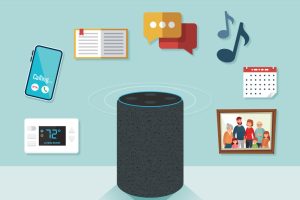
Here is the best part:
With a smart speaker, you can make phone calls, set reminders, play music, receive news update, and ask questions via smart assistant.
Mind-blowing, right?
There are also some smart speakers—like Amazon Echo Plus and some Google Nest devices—that act as a hub, controlling smart devices in the home via voice command.
Common smart speakers to consider for your South African home are:
- Amazon echo dot
- Google nest mini (2nd Gen)
- Apple homepod mini
- Sonos era 100
Selecting the right smart speaker for your home depends on the brand you are already invested in. Are your gadgets Apple products? If yes, go for Apple smart speakers. The same applies to other brands.
Add Some Smart Lighting
“Hey Google, turn the Lights off!”
Unlike the traditional South African led light that is controlled manually, smart light is often controlled via an app, remote, or voice command.
The lighting also allow you modify the color, temperature, and even the brightness of the bulb, ensuring that you save money on energy bills.
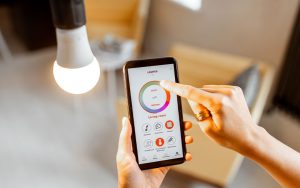
The best part?
Smart bulb has automation and scheduling features. This allows you to schedule times when the lights would go on or off. Or if you like, you can program it to turn on or off in response to certain triggers.
Popular smart bulbs to consider for your South Africa smart home are:
- Smart LED Opal Globe by Eglo
- Xiaomi Yeelight Smart LED Filament Bulb
- Mipow Lite Rainbow Colour Bluetooth Smart Bulb
- LIFESMART Blend RGB LED Light Bulb by Syntech
When selecting smart bulbs for your home, ensure they are compatible with your smart home platform or ecosystem. You can check the sticker on the body of the bulbs to confirm.
Smart Plugs
Smart plugs are another necessity required for setting up a South African smart home. They convert regular or non-smart home devices into smart components, allowing remote control via voice command or an app.
With smart plugs, you can control your fans, TVs, refrigerators, blenders, lamps, etc. You can also use the little devices to save money on energy bills by scheduling on or off times for your smart appliances.
Smart plugs are usually connected to a hub or a router. This enables them communicate with other devices like your smart phone or tablet. Kasa and Belkin smart plugs are popular smart plug brands to consider when setting up a smart home system in South Africa.
Smart Thermostat
A smart home in South Africa isn’t complete without a smart thermostat. This device helps control the heating and cooling appliances in your home, offering great convenience, energy efficiency and flexibility.
With a smart thermostat, you can control your AC or heating systems remotely via app or voice command, or schedule them to on or off at certain times.
Some smart thermostats—like the Google Nest Learning Thermostat—have advance features which enables them to automatically adjust temperature based on user’s behavior or preferences.
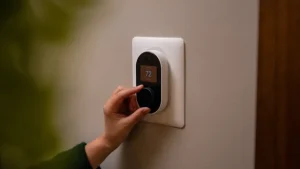
There are also smart thermostats with geofencing feature. This enable them adjust your home temperature based on your proximity. For instance, when you are approaching your home, your smart phone sends a signal to the thermostat causing it to adjust to your preferred temperature setting. And when you leave your home, it reverts to energy saving mode.
Some of the best smart thermostat to consider for your smart home are:
- Amazon smart thermostat
- Ecobee smart thermostat
- The Google nest learning thermostat
When selecting, try to choose one that satisfies the features that are important to you.
Do you want a smart thermostat with good temperature monitoring capabilities?
Or do you want one with energy reporting so you can make informed energy decisions and save money on your energy bills? Select a thermostat that suits your goals for a more personalized experience.
Smart Security Devices
Security is a major concern for every home owner in South Africa, hence the need to include smart security devices to your smart home. With the following smart security devices, you can beef up security in and around your home.
Smart Security Camera
Smart security cameras can be installed in various vantage points in your home. They come with two-way communication, motion sensors, spotlights, night vision, and other features that help you monitor your home remotely.
Like other smart devices, footages from a smart security cameras can viewed from a smart phone, laptop or tablet from anywhere with a good internet connection.
Here is what David VanWert, a home technology consultant and founder of VanWert Technology Design Inc has to say about smart cameras:
“Homeowners, in general, like to be able to keep an eye on things, whether it’s knowing about particular incidents or simply seeing who just came to the front door, a security camera can do that for you.”
You’d want to install smart security cameras in the gates and all main entrances of your home on the ground floor. Don’t forget to add cameras in the rooms that you frequently pass through to enter or exit your home. This makes it easy to monitor movements in and out of your apartment.
Video Door Bells
Video door bells are often partnered with a digital doorbell, a camera, and microphone. They allow homeowners monitor their front door and exterior surroundings easily. With video door bells, you can verify the identity of visitors before letting them into your home.
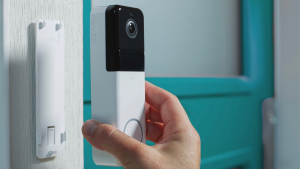
Some video door bells come with sensors that alert homeowners when motion is detected near their door entrance. Installing a video doorbell can also act as deterrent to burglars who don’t want to be caught in the act.
Smart Locks
The alarming rate of house burglaries in South Africa is a good reason to install smart locks in your smart home. Smart locks add another layer of security and convenience to your smart home.
Picture this:
You return home after a good day grocery shopping with friends. At the entrance of your gate or front door, you try to reach for your keys in your purse, but both of your hands are filled with shopping bags stuffed with groceries.
You become frustrated.
With a smart lock installed in your home, you don’t have to go through such hassle. With the tap of a finger, a face scan, or a voice command, you can open your door or gate and stroll into your home like a boss. In addition to allowing easy access to your home, smart locks can do other cool stuffs.
Plus, they allow you to create permanent or temporary entry codes for visiting guests, cleaning services, and members of your family. They also allow remote control via app and alert you to activities in your home.
Smart Sensors
Smart sensors are devices that alert you and activate security measures when suspicious activities are detected in your property. For instance, if an intruder is trying to break into your home, a smart sensor will alert you of the impending danger causing you to make informed decisions.
The sensor can also trigger security systems like alarms, lights, or notify security personnel on your behalf.
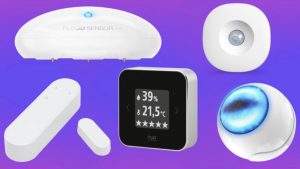
Common places to mount sensors in your home are:
- Doors (entrance and exit doors)
- Windows
- Corners
- High traffic areas
- Basements
- Near valuables
- Garages
- Other entry ways
When the smart sensors detect unauthorized activities, you’ll receive alerts on your phone or tablet.
In addition to motion sensors, you can also consider investing in
- Light sensors
- Smoke detectors
- Water leak sensors
- Air quality sensors
- Temperature sensors
Smart Lighting
Smart lighting helps illuminate your home via a voice command or an app.
But they do more than that.
They also help startle and deter potential intruders by turning on when suspicious motions are detected in or around your home.
Do you travel a lot?
And is your house often unoccupied when you travel? Smart lightings can come in handy. You can schedule them to turn on when you are away, thus creating the impression of an occupied home and deterring potential intruders in the process.
Wrap Up: A Smart Home is the Future
Setting up a smart home in South Africa may seem challenging at first, especially for a beginner.
But the truth is:
Setting up a smart home doesn’t require much brainwork or hassle if you understand your smart home goals and have a clear plan in place. Installing the devices isn’t challenging as well, as some smart home devices are DIY-friendly.
Those that aren’t can be installed with the help of a professional. Remember, investing in a smart home in South Africa is an investment in your security, convenience, and energy efficiency.








This is my first time pay a quick visit at here and i am genuinely pleassant
to read everthing at one place.